Content marketing is a powerful tool that businesses can use to reach their target audience, build relationships, and generate leads. Whether you’re a small startup or an established business, content marketing is essential for success in today’s digital world.
In this ultimate guide to content marketing, we’ll discuss everything you need to know about creating and executing a successful content marketing strategy.
What is content marketing?
You may have heard of content marketing in passing, but do you really know what it means?
Content marketing is an effective way to reach potential customers and engage with them in meaningful ways. It involves creating and distributing valuable, relevant, and consistent content to attract and retain a target audience.
A content marketing strategy can be used for many purposes, including lead generation, brand awareness, thought leadership, customer loyalty/retention, or even to generate sales.
Simply put, content marketing means planning, producing, distributing, sharing, and publishing content via social media, blogs, websites, podcasts, applications, press releases, print publications, etc.
Why is content marketing important?
Creating a successful content marketing campaign helps you in many ways:
1- It has the power to give your potential customers satisfying experiences that will entice them to buy more from you.
2- Content marketing not only precedes traditional marketing strategies, but it also generates a lot more website traffic and leads. Consistent content creation increases website traffic, which also increases conversions and ROI.
3- A quality content marketing strategy can help your business gain traction on social media.
4- Your consistent, high-quality content production will also benefit your SEO efforts.
5- Consumers would rather see content than ads. Consumers today prefer to conduct their research before making a purchase. They enjoy knowing about the best solutions available through content, and it helps them know and trust companies.
Types of content marketing
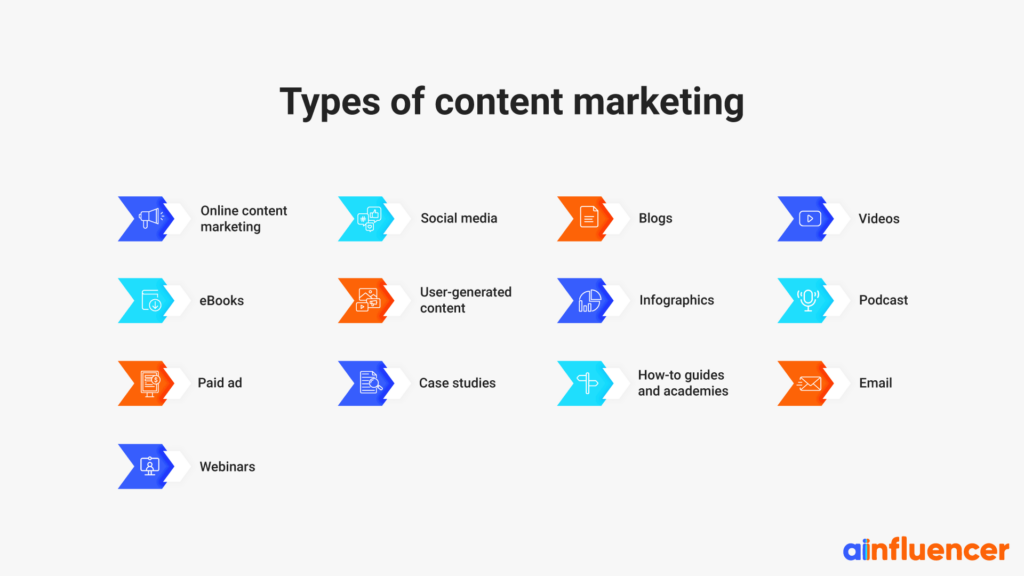
1- Online content marketing
Online content marketing is a powerful tool for businesses and individuals looking to gain an advantage in the digital world. It’s a form of internet marketing that involves creating and sharing relevant content online in order to increase brand awareness, engage customers, and ultimately drive more sales.
Any material you publish online is referred to as online content marketing. You can rank higher in the search engine results pages (SERPs) and get in front of the right audience at the right time with a solid online content marketing strategy.
2- Social media
The use of social media to market products and services has become an integral part of many businesses’ marketing strategies. With 4.2 billion active users worldwide, it’s understandable why.
Social media content marketing involves creating, sharing, and optimizing the content on social media platforms such as Facebook, Twitter, Instagram, YouTube, and LinkedIn.
Note: Most brands prefer to take advantage of influencer marketing strategies to make the most of their social media content marketing strategy.
Do you wonder how to run a successful influencer marketing campaign? Then all you need is an influencer marketplace like Ainfluencer.
How Ainfluencer helps social media content marketing?
Ainfluencer is a quality influencer marketplace that acts as a middleman to connect brands with the right influencers. Collaborating with a niche-related influencer to elaborate your content can help you take your social content marketing strategy to the next level.
Influencers can also create quality content about your products and services on your behalf and share it with a handful of audiences that trust them.
Ainfluencer lets you easily find influencers thanks to its AI-powered search engine and custom search filters such as location, hashtag, gender, language, etc.
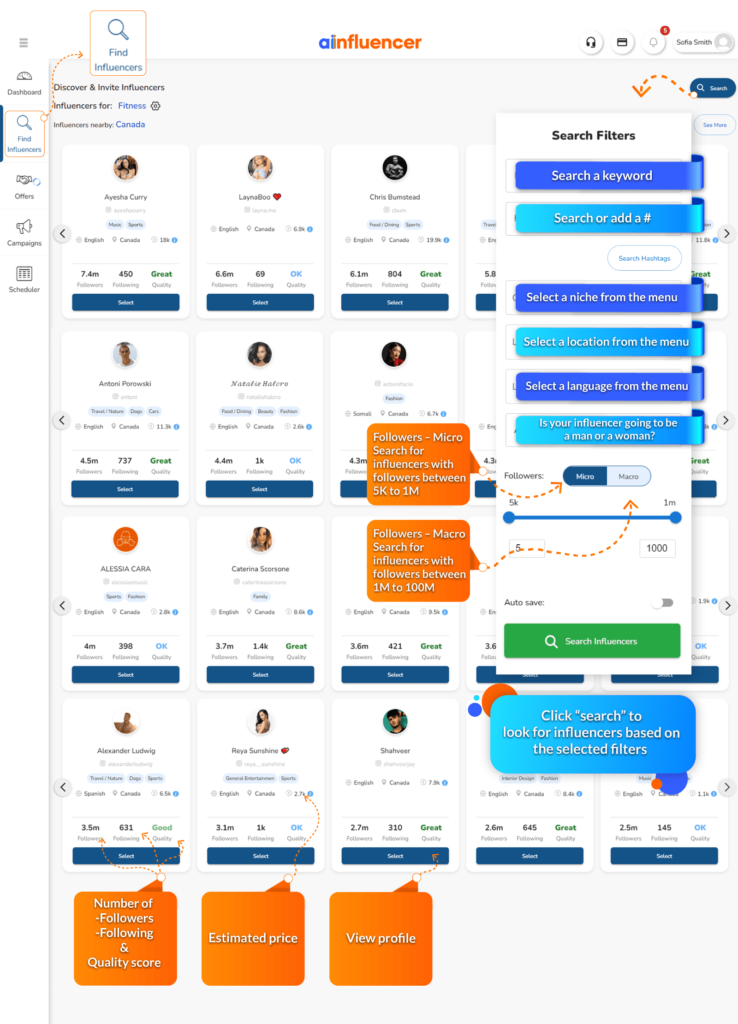
It also offers you campaign management features and insight and analytics for your campaign.
3- Blogs
Blogging has become one of the most popular staples of content marketing, allowing companies to showcase their knowledge, share stories and promote their products or services.
With blogging, your site ranks higher in Google search results, and your homepage, product, and blog pages will be more visible. You can also promote other internal and external content and blog articles with links, including product information, and add social share buttons.
4- Videos
Video content is the most significant and popular type of content marketing. 88% of people say branded videos convince them to buy a product or service. Wherever you share your video content, you’ll increase your conversions and ROI and improve audience relationship building.
5- ebooks
Ebooks are a great content type to offer in exchange for details like a name and email address. This kind of publication entices readers, especially when the subject matter is relevant to them.
Ebooks provide you the opportunity to delve deeper into the content by covering topics that weren’t covered in a typical blog post, in addition to collecting customers’ information through forms on landing pages.
6- User-generated content
User-generated content (UGC) marketing refers to an online content marketing strategy of leveraging content created by customers or fans of a brand to promote that brand. This type of content can include reviews, testimonials, social media posts, photos, and videos.
The aim is to showcase the brand’s products or services through the experiences and perspectives of real customers, thereby increasing brand awareness, trust, and engagement with target audiences.
7- Infographics
Infographic content marketing uses visually appealing and informative graphics to communicate complex information or data in an easy-to-understand manner.
It works by presenting information in a creative and attractive way that draws the reader’s attention, making them more likely to retain and share the information. Infographic content can be shared across various online platforms, such as social media, websites, and blogs, to reach a wider audience and drive traffic to a brand’s site.
8- Podcast
More than 60 million people listen to podcasts across the Spotify and Apple Podcasts platforms.
Podcast content marketing refers to the use of podcasts as a content marketing campaign tool to reach and engage with a target audience. This may involve creating original podcast content that features or promotes a product or service or appearing as a guest on relevant podcasts to build brand awareness and credibility.
9- Paid ad
Paid ad content marketing is a form of digital advertising where businesses pay to promote their content, such as articles, videos, images, etc., on social media platforms, search engines, or other websites.
Examples of paid ad content marketing include sponsored posts on social media, Google AdWords, and website display ads.
10- Case studies
Case studies are a way for content marketers to take their marketing content to the next level. The best credibility boosters for a brand are case studies and customer testimonials.
Case studies tell the success story of a customer supported by their testimony.
You should do a client interview in order to develop a case study and testimonial. Ask them to describe the type of issue they were seeking to resolve and to demonstrate how your product or service helped them resolve it.
Case studies can help content marketing in several ways:
- Providing Social Proof: Case studies showcase real-world examples of how a product or service has helped other customers, which can increase trust and credibility with potential customers.
- Demonstrating Value: By highlighting the specific challenges customers faced and how they were resolved, case studies can help demonstrate the value and effectiveness of a product or service.
- Driving Traffic and Lead Generation: Case studies can be used to attract and engage target audiences with calls-to-action that drive traffic to a website or encourage lead generation.
- Repurposing Content: Case studies can be repurposed into different formats, such as videos, blog posts, e-books, and infographics, to increase visibility and reach a wider audience.
11- How-to guides and academies
By providing valuable information and advice, how-to guides and academies can help establish your brand as an authority in your industry, demonstrating your expertise and building trust with your audience.
So how-to guides and academies can help your content marketing strategy in several ways:
- Establishing authority
- Generating leads
- Building engagement
- Improving search engine optimization (SEO)
- Driving traffic
12- Email
Email marketing is a form of digital marketing that involves sending promotional, transactional, or direct emails to a target audience to build relationships and convert them into customers.
It collects potential customers’ email addresses through website sign-ups, opt-in forms, or purchased lists and then uses email software to send bulk emails to these addresses.
The emails may contain information about new products, special offers, educational content, or anything else the sender thinks might interest the recipient.
An email marketing campaign aims to drive engagement and conversions by establishing trust and adding value for the recipient.
Open rates, click-through rates, and conversion rates typically measure the success of an email marketing campaign.
13- Webinars
A webinar is a live, online seminar or presentation conducted over the internet and attended by participants in real time. Webinars are typically used to educate and inform attendees about a particular topic and provide them with valuable insights and information.
Webinars help a content marketing strategy by allowing a business to reach a large, targeted audience in a cost-effective and engaging way. By offering valuable information and expertise on a specific topic, a business can establish itself as a thought leader in its industry and build trust and credibility with its audience. Webinars also provide an opportunity for businesses to interact directly with their target audience, gather feedback, and build relationships. Additionally, the content from a webinar can be repurposed and used for other marketing efforts, such as social media posts or blog articles, to further promote the business and its offerings.
How to create a content marketing strategy?
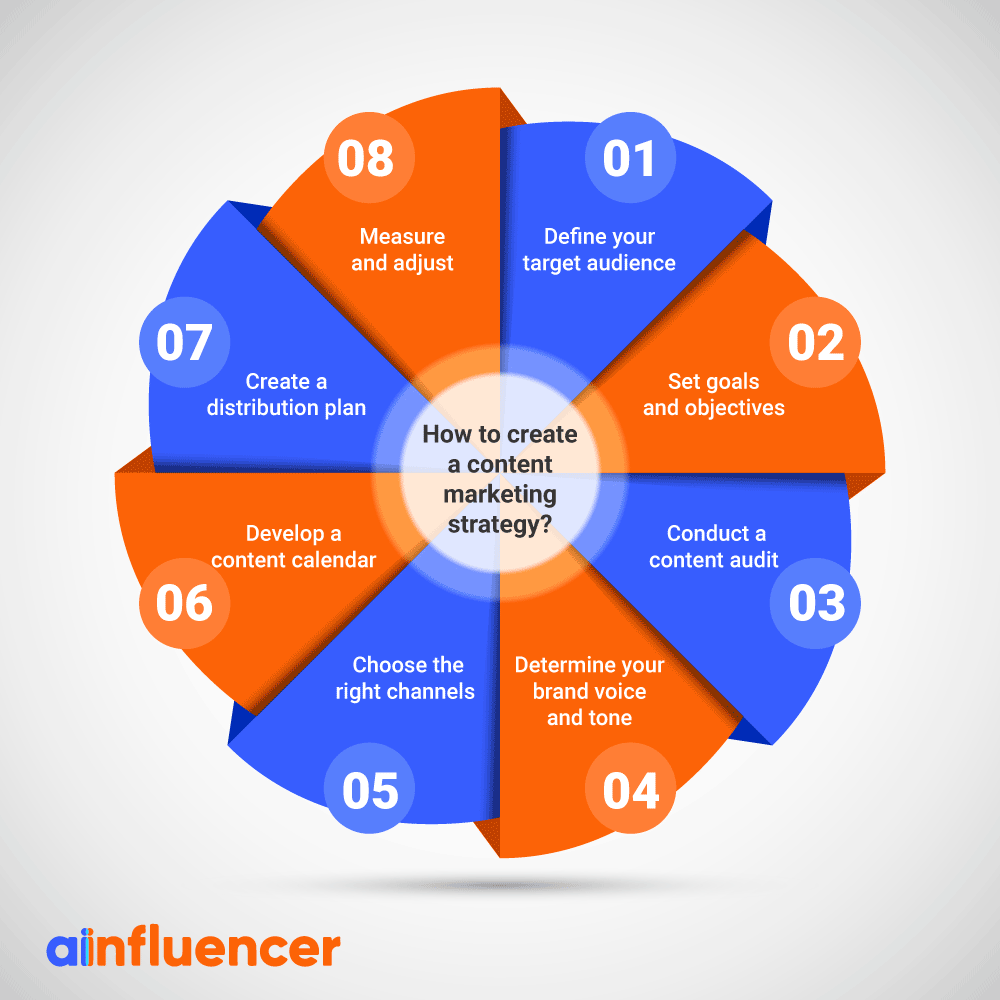
To create a content marketing strategy, follow these steps:
1- Define your target audience
Identify the demographics, interests, and pain points of your ideal customer.
2- Set goals and objectives
Decide what you want to achieve with your content marketing efforts and establish specific, measurable goals.
3- Conduct a content audit
Assess your current content assets and identify what’s working and what needs improvement.
4- Determine your brand voice and tone
Establish how you want your brand to be perceived and the tone you want to use in your content.
5- Choose the right channels
Decide where your target audience spends their time online and which channels will be the most effective for reaching them.
6- Develop a content calendar
Plan out the types of content you will create, when you will publish it, and who will be responsible for creating it.
7- Create a distribution plan
Determine how you will promote your content and get it in front of your target audience.
8- Measure and adjust
Regularly measure the success of your content marketing efforts and make adjustments as needed to ensure you are meeting your goals and objectives.
Remember, a content marketing strategy is not a one-time effort but an ongoing process that should be regularly reviewed and updated based on your results and changing circumstances.
Top content marketing tools
Here are some popular content marketing tools:
- Hubspot – An all-in-one platform for inbound marketing, sales, and customer service
- SEMrush – A digital marketing toolkit for search engine optimization, pay-per-click advertising, and content marketing
- Hootsuite – A social media management platform
- CoSchedule – A marketing management and content organization platform
- Mailchimp – An email marketing platform
- Canva – A graphic design tool for social media and other visual content
- Google Analytics – A web analytics service that tracks and reports website traffic
- Ahrefs – A comprehensive SEO toolset for backlink analysis, keyword research, and more
- BuzzSumo – A tool for finding and analyzing the most shared content online
- Trello – A project management tool that can be used to plan, organize, and track content projects.
Content marketing channels
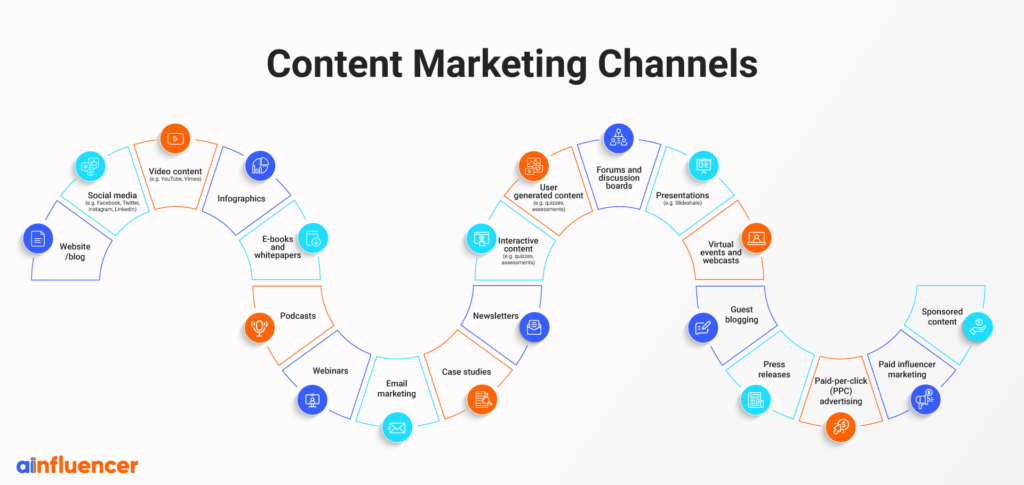
Here are some common content marketing channels:
- Website/blog
- Social media (e.g., Facebook, Twitter, Instagram, LinkedIn)
- Video content (e.g., YouTube, Vimeo)
- Infographics
- E-books and whitepapers
- Podcasts
- Webinars
- Email marketing
- Case studies
- Newsletters
- Interactive content (e.g., quizzes, assessments)
- User-generated content (e.g., reviews, testimonials)
- Forums and discussion boards
- Presentations (e.g., Slideshare)
- Virtual events and webcasts
- Guest blogging
- Press releases
- Paid-per-click (PPC) advertising
- Paid influencer marketing
- Sponsored content
Conclusion
In conclusion, content marketing is a powerful tool to reach your target audience and increase your company’s presence online. From understanding how content marketing works to developing the right creative content strategy and tailoring it to your target audience, this guide has provided you with all the information you need to make content marketing work for you. The key is to be consistent, patient, and strategic to get the best results from your content efforts.
FAQs
1. Examples of content marketing include:
2. Blog posts and articles
3. Infographics
4. E-books and whitepapers
5. Video content (such as explainer videos or tutorials)
6. Social media posts (such as Facebook and Instagram posts)
7. Interactive content (such as quizzes or surveys)
8. Case studies and success stories
9. Email newsletters
10. Podcasts
11. Webinars and live streaming events
1. Know your audience: Understanding the needs, wants, and pain points of your target audience is crucial for creating relevant and valuable content.
2. Be consistent: Consistently producing and distributing high-quality content helps build trust and establish your brand as a thought leader in your industry.
3. Offer value: The content you create should provide value to your audience, whether it’s informative, educational, or entertaining.
4. Tell a story: People are naturally drawn to stories, so incorporating storytelling elements into your content can help engage your audience and make your brand more memorable.
5. Measure and adjust: Continuously measure the success of your content marketing efforts and adjust your strategy as needed to ensure that you’re achieving your goals and reaching your target audience effectively.
1. Know your target audience.
2. Create valuable and relevant content.
3. Use data-driven insights.
4. Mix up the types of content you create, such as blog posts, videos, infographics, and podcasts.
5. Use a variety of channels, including social media, email, and advertising, to promote your content.
6. Regularly measure the performance of your content and optimize it.
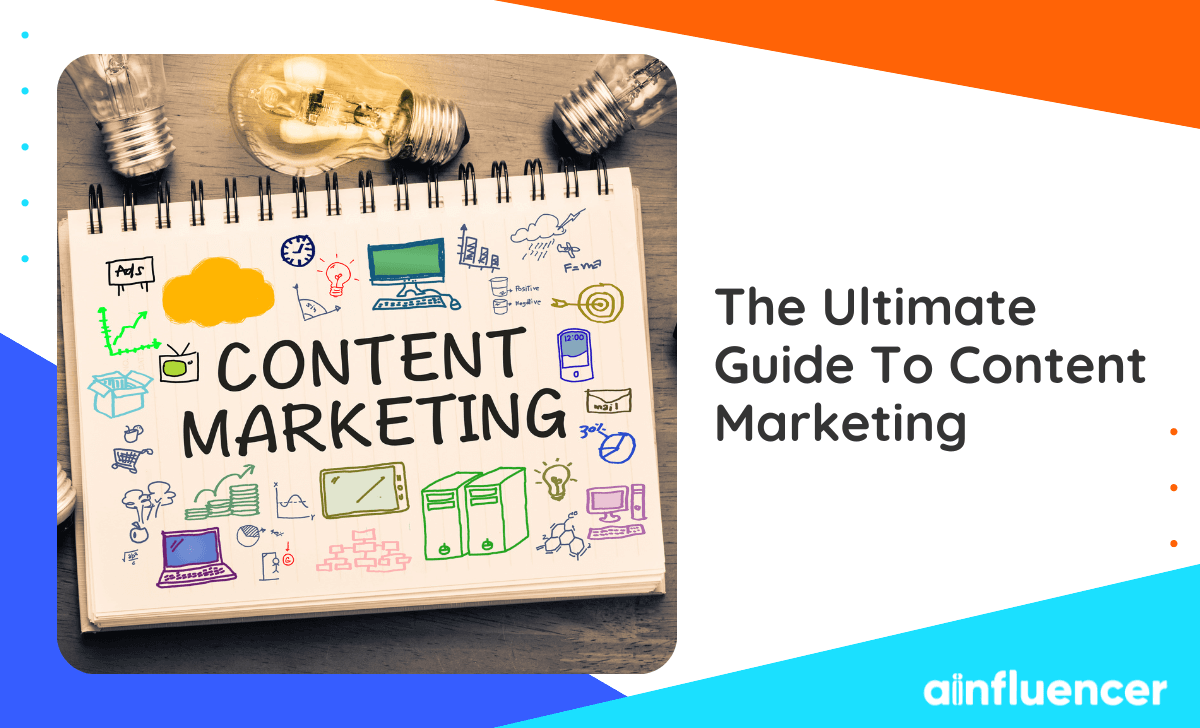


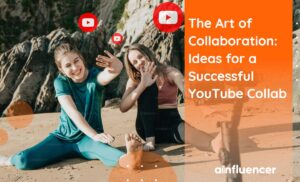


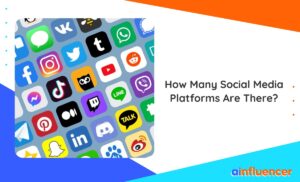
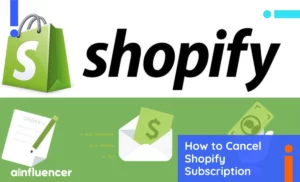

![Read more about the article Verifying Email Addresses: How It Works [2024 Update]](https://blog.ainfluencer.com/wp-content/uploads/2024/06/Verifying-Email-Addresses-How-It-Works-2024-Update-300x182.jpg)